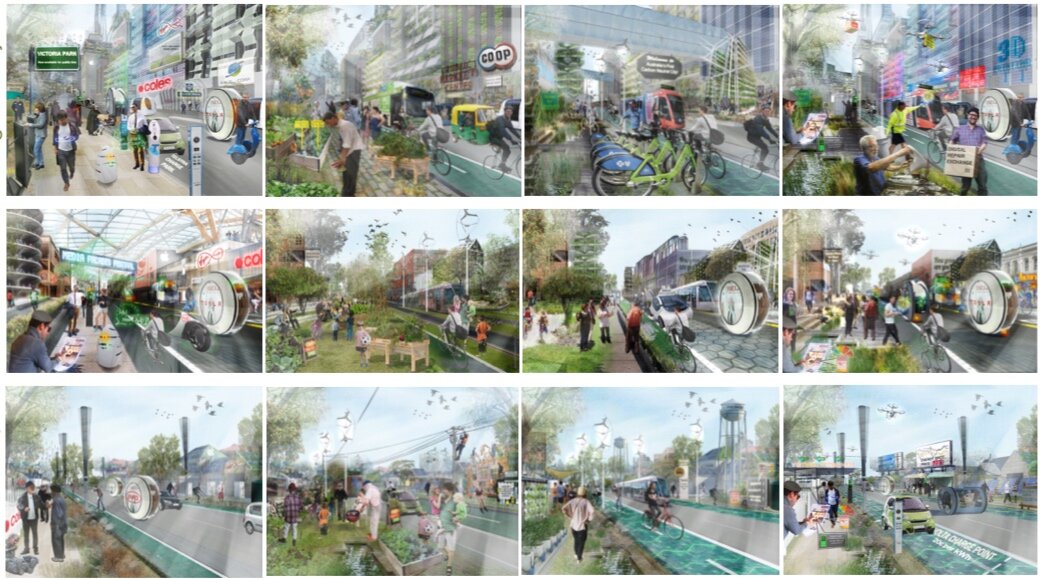VP 40 Objectives and methods
Objectives:
The VP2040 research aimed to:
track current research, industry and policy intelligence and coordinate with other international foresight and backcasting projects;
identify emerging technological and social innovations with the potential to disrupt current trajectories of unsustainable development;
collaboratively develop and refine a set of visions and scenarios for low-carbon resilient cities;
to define a set of possible futures for four southern Australian cities - Sydney, Melbourne, Adelaide and Perth;
translate those scenarios into communicable visions of future life to stimulate engagement across all the sectors of CRCLCL, including the general public; and
backcast from those futures to develop potential pathways for their realisation, including niche innovations, research priorities, policy measures and governance structures.
It also had a set of utilisation objectives:
to develop visions, scenarios and pathway analysis for strategic decision-making by the CRC and its partners;
to provide a mechanism for the CRC to engage more widely with its various stakeholders, to establish and communicate new expectations about futures and directions for research, innovation and practice;
to bring together the technical, economic and social aspects of the transition to low-carbon urban living to help the CRC explore key interrelationships and uncertainties across its projects;
to provide a critical platform for the strategic planning and prioritisation of CRC research and for understanding the cross-disciplinary and cross-professional-practice implications of CRC research findings; and
to identify new socio-technical systems that could constitute the basis for CRC living laboratory experiments.
Project Methodology:
coordinated research and engagement process
click to enlarge
iteration of visions, scenario formation and back-casting to critically review pathways from ‘now’ to scenario future.
click to enlarge
sample cloud tag from exploration of dynamics of change - from research and polling of audiences at expert conferences of CRCLCL
click to enlarge
simplified model of complex forces that shape ‘a city’. used to guide research, workshop exploration and elements of future scenarios
click to enlarge
VP2040 was simultaneously a research project and a process of engagement with a panel of over 250 experts who contributed to visualisation workshops and a progressive critique of research and scenarios. To assist the research and engagement, a simplified schema of ‘the city’ was developed with a focus on elements involved in transformation for resilience and decarbonisation. Research first focused on the dynamics of change; both the ‘drivers of change’ as well as ‘disruptive forces’; covering disruptive shifts in technology, socio-cultural dynamics, organisational developments and external forces (essentially environmental and physical limits).
Throughout VP2040, the team drew on related projects in the UK and Europe. Representatives from those overseas projects formed an international scientific committee for the project. .
A sequence of workshops brought together members of the expert panel using a ‘layered system mapping’ methodology to consider possible changes to production and consumption that could lead to lower carbon emissions. The output of this process became briefs for a series of design charrettes which produced visualisations of elements of transformed city conditions. These visualisations were made widely available for reproduction, reaching public media as well as researchers and policy makers. These visualised scenes were debated in workshops as representative of dynamics of change; any dynamic that appeared particularly critical or controversial became the focus for expert round-tables that were convened as a sounding board for the research team (see expert workshop research papers).
suburban Sydney today and in a sustainable 2040.
click to enlarge
a future scenario for the Sydney harbour bridge, 2040
click to enlarge
refuse of ‘old’ freeway infrastructure, 2040
click to enlarge
2040 Melbourne
a suburban street in Melbourne 2040
Scenario Process AND SCENARIO SUMMARIES
(Note: For more detail, download the Scenarios 2040 and the Pathways 2040 reports.)
